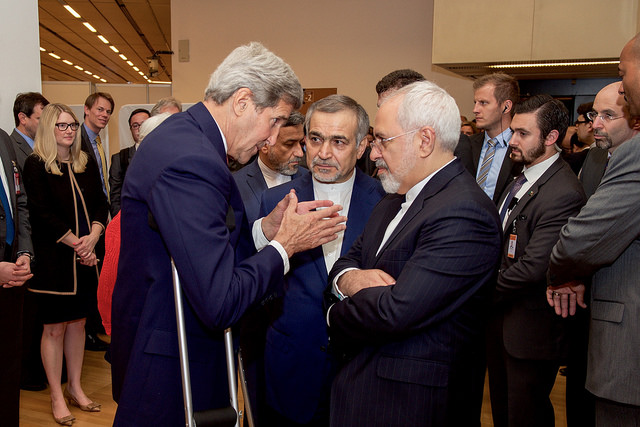Here is my bi-partisan proposal to opponents of the deal: don’t cut our countries adrift from our allies, and don’t light my region on fire. If this deal falls, I’ll have to suffer the consequences of the war you chose.

Criticize Jewish or Israeli opponents of the Iran deal, and you are an anti-Semite. Not only that; conservative hysterics now say you have de facto accused such opponents of dual loyalty, an antiquated anti-Semitic charge being wielded as precisely as a club.
It’s time to drop that old trope altogether. The very idea that there’s something wrong with dual loyalty is obsolete. It’s a fossilized relic of single-identity patriotism to the patria from centuries past. Nowadays, people migrate, have mixed heritage, multiple citizenships, meta-state communities and even multiple sexualities.
I am proudly loyal to both the U.S. and Israel. I have the tax returns to prove it. And it is a privilege; I am enriched by seeing and feeling the arguments of both sides, and I share in the needs of both. Most of the time these interests are highly aligned. When the needs differ, they often complement each other.
It is good that Israel’s security needs have been so front and center to the negotiations over curbing Iran’s nuclear program. Never mind that Prime Minister Netanyahu’s apocalyptic predictions about Iran destroying Israel are fetishized manipulations for his own political image. Even paranoids have enemies and there has been some value in reminding the negotiating countries across the sea or the ocean about the regional concerns right here. A nuclear armed Iran really could upset the balance of power in the Middle East, embolden actors such as Hezbollah and accelerate the existing arms race. The left must know that these factors could affect not only our lives but the possibility for resolving the Israeli-Palestinian conflict.
With the unrelenting voices of Israeli concerns in their ears, the powers have reached a deal with Iran. Is it good, bad, the best we could so, or disastrous? Mere mortals who are not nuclear scientists (those who are support the deal) must take our cues from figures we trust and choose the arguments we find most credible. It’s hard when political interests merge with substance and regular people don’t know what’s real.
But the overriding argument that trumps all others is what President Obama said in his speech: it’s this or war – there is no third way left.
[O]ur closest allies in Europe, or in Asia — much less China or Russia — certainly are not going to agree to enforce existing sanctions for another 5, 10, 15 years according to the dictates of the U.S. Congress….[T]hose who say we can just walk away from this deal and maintain sanctions are selling a fantasy.
Thus, Netanyahu’s speech in Congress this spring was trickery; not because it played into his political campaign but because he shrewdly left out talk about the military option. I mean, did he think nobody would notice? Obama said:
Congressional rejection of this deal leaves any U.S. administration that is absolutely committed to preventing Iran from getting a nuclear weapon with one option — another war in the Middle East… Does anyone really doubt that the same voices now raised against this deal will be demanding that whoever is President bomb those nuclear facilities?
Of course we can’t doubt that, because “those voices” who are in Israel already did demand to bomb the facilities. Just a few hot summers ago, Benjamin Netanyahu and Ehud Barak, and possibly Defense Minister Moshe Ya’alon beat the war drums. We need not guess about the future, just look into the very recent past.
As an Israeli, what really scares me is another war in the Middle East that directly involves Israel. The moral horror of the current asymmetrical war against Palestinians is bad enough; a state-to-state conflict between Israel, the US and Iran, is inconceivable.
Such a war would leave our two countries totally isolated from other Western allies in the effort. It would push the proxy wars that Iran already supports to a frenzy; Iran would feel justified supporting state and non-state actors alike far beyond the theater of war, if such a term can even still be used. We can expect terror attacks in Argentina and Mumbai, funded and fomented by a regime that will feel no need for restraint. Saudi Arabia might escalate support for its own proxy fighters in response, making this region all but uninhabitable. Israel’s worst nightmares should Iran develop nuclear weapons are most likely to materialize if we wage war putatively to prevent those weapons.
The insane thing (Obama undersold this by calling it “ironic”) is that the military option won’t even work. It is common wisdom – received largely from Israeli security gurus – that a strike can only set back Iran’s nuclear program. A strike will end hope of inspections, instead of institutionalizing them for decades. But then, when have our wars worked lately? After three of them in Gaza, rockets are still being fired into Israel.
War is an automatic weapon in this region. Obama proposed a different vision. He didn’t invent it himself; he drew on bi-partisan American icons:
“Peace is not the absence of conflict,” President Reagan once said. It is “the ability to cope with conflict by peaceful means.” President Kennedy warned Americans, ‘not to see conflict as inevitable, accommodation as impossible, and communication as nothing more than the exchange of threats.’”
Here is my modest bi-partisan proposal to opponents of the deal, as an Israeli and as an American. Don’t cut our countries adrift from our allies. Don’t light my region on fire; if this deal falls, I’ll have to suffer the consequences of the war you chose.



